Asphalt paving is an investment and may have you asking some questions. What exactly is asphalt paving? How long does it last? How does it compare to concrete? Is it worth it?
These are great questions to be asking!
As with any investment, you want to make sure you’re getting a quality product and a good return on your investment.
Today, we’re here to answer your questions about asphalt paving.
Let’s begin!
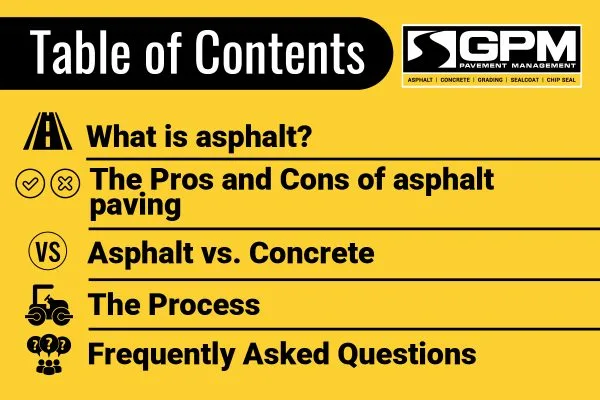
What Is Asphalt?
Let’s start with the basics.
Asphalt is a mixture of different materials and an oil derivative that is used for paving surfaces.
Asphalt is made with aggregates (different, unrelated materials), binders, and fillers. Common aggregates include the following:
- Crushed rock
- Sand
- Recycled material
- Slag (waste that forms when refining ore)
- Gravel
There are six steps to making asphalt:
- The different aggregates are brought to the manufacturing site and stored in different bins. At this stage, they are generally ambient temperature and damp.
- The aggregates are dried and begin to warm.
- After they are dried, the aggregates are heated in a very hot elevator.
- The aggregates are sorted according to size. Pieces that are too large are removed.
- The aggregates are mixed with a filler material and a binder to hold the mixture together.
- The asphalt is transported to the work site or to a storage facility.
Bitumen, a substance formed by distilling crude oil, is the most common binder used in asphalt paving. Common fillers include slate dust, cement, and limestone dust.
Asphalt mixes are distinguished by the temperatures they are at installation – hot, warm, and cold. These mixes have various subtypes and each serves a slightly different purpose.
- Hot mix asphalt – Is commonly called blacktop and is used on roads, driveways, and parking lots. Common aggregate sizes are ⅜”, ½”, and ¾”
- Warm mix asphalt – A newer, more environmentally friendly approach to paving
- Cold mix asphalt – Used for temporary repairs in low-traffic areas
Now that we have a basic understanding of what asphalt is, let’s move on to the pros and cons of asphalt paving.
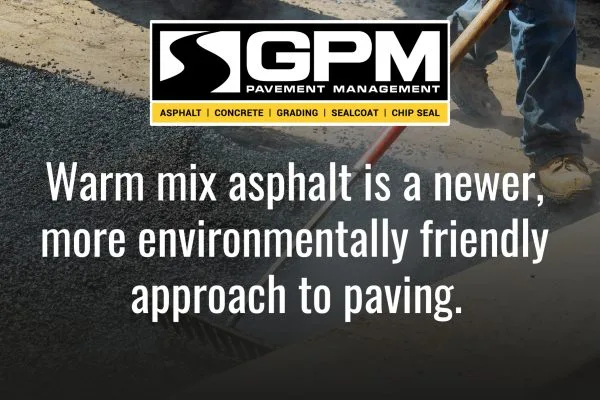
The Pros and Cons of Asphalt Paving
The Pros
- Ease of installation
Asphalt is relatively easy to install. The primary benefit of the installation stage is that asphalt cools and hardens quickly. You can begin using the paved surface within about 24 hours. It’s important to note though that it actually takes between 3-12 months for asphalt to completely cure. During this time, it is more easily damaged.
- Cost
Asphalt is an affordable paving option typically running between $2 and $5 per square foot. While there are cheaper options (gravel, for example), most paving options cost significantly more. We’ll address this in a bit more detail later.
- Durable
If properly maintained, asphalt can last 20+ years as it is quite durable. Preventative maintenance such as keeping your paved area clean, repairing damage immediately, and regularly sealcoating may extend this estimated lifespan. Asphalt is rated to withstand low temperatures, making it a great option for regions with cold, harsh winters.
- Ease of Maintenance
Maintaining and repairing asphalt is relatively simple so those who want to DIY can certainly do so. However, it is important to remember, particularly with repairs, that there is a greater risk of mistakes if you aren’t experienced with the correct process or lack the best equipment
- Flexibility
Asphalt is quite flexible, decreasing the impact of pressure, traffic, and temperature. This makes it a great option for flexible climates!
- Hides Stains and Spills
Because of its dark and textured surface, asphalt does a great job of hiding stains and spills. It is also less affected by salt and other snow and ice-melting substances. This is great for maintaining a new look even with normal wear!
- Safety Considerations
There are some safety benefits to an asphalt driveway, especially in the winter. Since the surface is dark, it absorbs heat, and snow and ice melt off more quickly.
- Noise Reduction
Asphalt is a quiet paving option. Its open-graded surfaces and fine-graded surfaces absorb noise. If the asphalt is porous, the effect is increased. The materials that comprise asphalt also aid in noise reduction. A new, eco-friendly asphalt mix called rubberized asphalt has been demonstrated to reduce road noise by 50-90%!
- Drainage
Asphalt is generally good for drainage, but it’s not all the same. A porous asphalt is an eco-friendly option since it diminishes run-off by allowing water to seep directly through the paved area into the ground. Other forms of asphalt can be installed in ways that redirect water as well.
- Recyclable
Asphalt is an eco-friendly paving option because it is 100% recyclable. And the best part? Asphalt becomes even stronger and rut-resistant after being recycled!
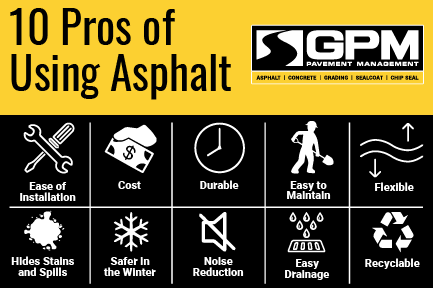
The Cons
No matter how many pros there are to a product, there are always a few cons to consider. Asphalt paving is no exception.
Let’s take a look at some things to be aware of before you use asphalt.
- Regular maintenance
Though the actual work of maintaining asphalt is relatively easy, it does require regularity. For example, asphalt should be seal coated every 3-5 years. However, sealcoating protects the asphalt and increases its lifespan making it worth the effort.
- Responds poorly in high heat
Asphalt is not always the best option for climates that experience extreme heat. While asphalt’s heat-absorbing qualities are great for cold climates, this feature can cause it to become soft in extreme temperatures. The cycle of softening in the summer and hardening in the winter causes an increase in cracks, sagging, and more.
- Lifespan
While asphalt’s lifespan is considerable, both gravel and concrete driveways last longer. However, there are other important factors to consider when choosing a driveway style. More on that in the next section.
- Style Limitations
Asphalt has one aesthetic – blacktop. It can’t effectively be stamped or dyed and often has unfinished edges. Despite this, the blacktop aesthetic is very versatile, matching well with most homes. The edges can also be lined with stone for a more detailed look.

Asphalt vs. Concrete
Asphalt and concrete are the two primary options if you want a paved driveway. The old debate continues. Which is better?
There are multiple components to consider before making a final decision.
Let’s start with installation.
- Installation time
Concrete takes much longer to install than asphalt. While an asphalt driveway is usable within 24 hours, concrete needs to cure for 3-7 days before it can be used.
- Lifespan
Concrete has a significant lifespan advantage. While asphalts generally last between 15 and 20 years, concrete can easily last 30 years. There are other factors, like weather, that affect concrete’s lifespan.
- Flexibility
Since it was designed to be flexible, asphalt functions better in extreme weather, especially cold. Concrete on the other hand does not flex. This causes it to crack, heave, or buckle in extreme cold, especially when it hasn’t been properly winterized. However, concrete responds well in hot climates, and its light coloring allows it to reflect rather than absorb heat.
- Versatility in Visual Appeal
As we mentioned previously, asphalt does come with a lot of aesthetic options. Conversely, concrete can be easily customized. It can be stamped to look like stone or brick, colored, or inlayed with decorative patterns or materials.
- Cost
While concrete lasts about twice as long as asphalt, the installation also costs as much as four times that of asphalt. This may seem staggering at first glance, but it really comes down to when, not if, you invest in your driveway. The cost of regular asphalt maintenance and repairs means that in the big picture, the two are comparable in cost.
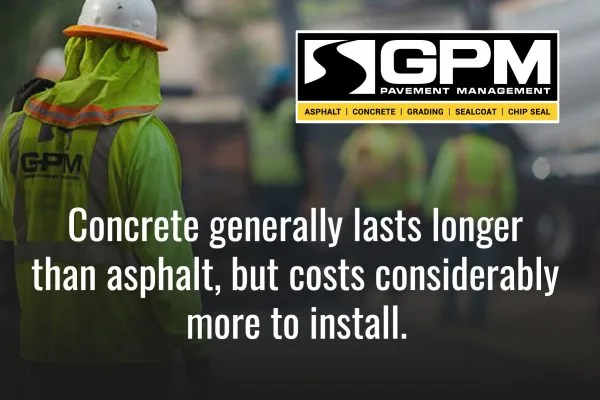
- Maintenance
Compared to asphalt, concrete takes very little maintenance other than winterizing if you live in a cold climate.
- Repairs
When asphalt needs to be repaired, it generally only requires surface work since the lower layers are pretty much permanent. This (generally) makes repairs simple. It’s also possible to blend repaired asphalt with the rest of the paved area. With concrete, however, repairs are difficult and are easily visible. If the damage is extensive, the entire slab will need to be repoured.
- Environmental impact
Because it is 100% recyclable, asphalt is considered more eco-friendly than concrete. Concrete, on the other hand, needs to be removed and disposed of in a special facility.
Asphalt and concrete are both quality products. The right one for you depends on the climate in your area, your needs and vision for your property, and how much you want to invest upfront.
Now that we’ve covered asphalt paving’s pros and cons, let’s take a quick look at the basic paving process.
The Process of Paving With Asphalt
Step 1: Site Preparation
This step involves diminishing and removing the old asphalt or concrete (if there is any) and disposing of it.
Step 2: Sub-Base Preparation
At this stage, the existing sub-base is built, repaired, or replaced as needed. The sub-base is then graded for proper drainage and finally compressed with a roller.
Step 3: Asphalt Installation
The final stage of the process is installation. Asphalt is installed with a paving machine and is done in two layers: the binder layer and the surface layer. Finally, the new asphalt is compacted and smoothed with a roller.

Frequently Asked Questions About Paving
As we wrap up this post, let’s address a few common questions about asphalt paving.
Is asphalt paving cheaper than concrete?
- Yes! Asphalt paving is significantly cheaper than concrete.
Does asphalt driveway increase property value?
- Yes. Paving your driveway is a great investment and increases your property value.
Can you put asphalt over concrete?
- Actually, yes. Concrete can serve as a good base for an asphalt road.
How thick should an asphalt driveway be?
- Asphalt in a residential driveway should be about 2-3 inches. If there will be heavy trucks using the paved area, it should be thicker – up to 7 inches in a heavy-duty commercial area.
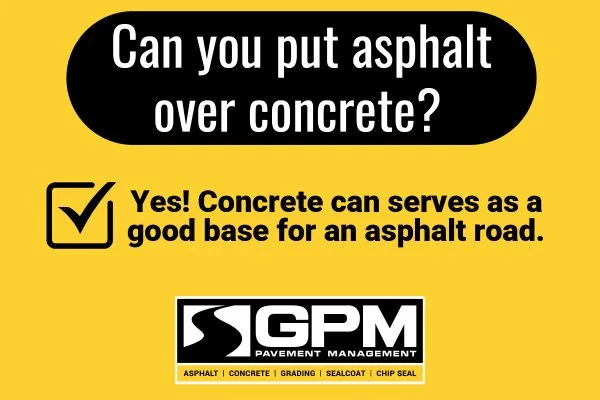
Conclusion
If you are considering paving, repairing, or sealcoating your driveway, private road, or parking lot, we’d be thrilled to help!
With over 30 years of experience, the team at GPM uses high-quality materials and implements best practices to deliver a product that ensures client satisfaction.
If you have any questions or are ready to get a quote for your project, contact us today! We look forward to hearing from you!
